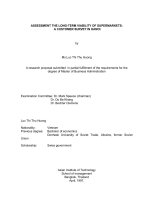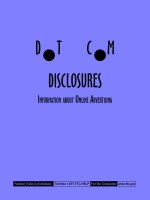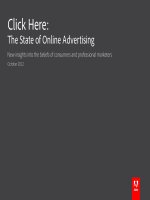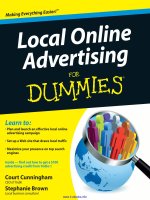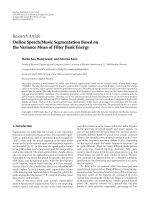Research proposal Online advertising activities
Bạn đang xem bản rút gọn của tài liệu. Xem và tải ngay bản đầy đủ của tài liệu tại đây (161.94 KB, 9 trang )
Student’s name: Truong Van Dung (Mr.)
Teacher: Assoc. Prof. Dr. Le Thi Lan Huong
Topic: Online advertising activities on the route Hanoi – Ho Chi Minh City of Vietnam
Airlines
1. Rationale
Advertising has been always a very important tool of connecting people who
want to sell something with ones who have the means to use those products or services.
Traces of advertising can be found even in ancient times and various ads were used in
ancient Egypt, Babylon and Greece. The development of media and high availability of
media channels boosted advertising. From 1704 when the first newspaper ad appeared
till now, advertising messages have constantly developed into various interesting,
original and even controversial issue.
After a year 2016 of many advantages, the world aviation market is going to face
new difficulties such as political instability in European countries (between Russia and
Ukraine), oil prices rise again. The business situation of airlines are difficult. The world
airlines must find out the right solutions to cut costs, improve the efficiency of
operating the fleet.
In domestic market, the increasing competition on Hanoi - Ho Chi Minh route
makes domestic airlines seek a way to introduce their products (flight timetable) to
their target customers. An advertising program is considered successful when
delivering clearly the message to the right customers with an acceptable cost.
According to that trend, Vietnam Airlines has researched and continuously
innovated its product (flight schedule, new aircraft modern) to suit the target
customers. Besides, advertising activities on the benefits that new products bring to
customers is also very necessary.
According to IATA report, Hanoi – Ho Chi Minh is in top five busiest routes on the
world. Lot of high revenue passenger who considering Vietnam Airlines’ target
customer, usually flight between Hanoi and Ho Chi Minh.
1.
Research objectives
The objectives of this research are as follows:
-
To identify the steps that create the advertising program Evaluating the effect of
advertising campaign for innovation on the route Hanoi - Ho Chi Minh;
-
To evaluate the advertising program on the route Hanoi - Hochiminh City of VNA
in order to find out the strengths and weakness of its advertising program.
Finding out the way to adjust ad campaign (if any);
-
To define the lessons learned and to propose solutions that improve the next
advertising program on the route Hanoi - Hochiminh City of VNA. Propose
solution to improve the next ad campaign of Vietnam Airlines.
2.
Research questions
In this study, some important questions are given as below:
3.
-
Message of advertising campaign awareness (how do target customers
understand about the campaign?) What are the steps that create the
advertising program?.
-
What is the situation (strengths, weaknesses) of the advertising program on the
route Hanoi - Hochiminh City of VNA in 2016?How do customer feel about
frequency of Vietnam Airlines’ ad is it?
Literature review
Advertising has various roles in a business, among which the most important are:
informing the potential target group (or target customer) about appearance of new
product/service in order to persuade customer to buy some specific good or service. A
lot of research has been conducted in order to analyze or find out the effectiveness of
advertising program. “Advertising is any paid form of non-personal presentation and
promotion of ideas, goods or services by an identified sponsor” – Philip Kotler. In order
to measure the effectiveness of advertising activities of Vietnam Airlines, I will apply
5M model (Marketing management - Philip Kotler).
Besides, research analyzing and evaluating Vietnam Airlines advertising
campaigns can be reflected in two important aspects:
Firstly, the performance of the advertising activity is determined by the level of
awareness of the customer.
Secondly, in the thesis I measure the impact of the advertising on customer’s
awareness and decide based on that which channel is more effective.
Teo etal. (2003) proposes a research model in order to investigate the influences
of interactivity level on web user’s attitude towards commercial websites. Afterwards,
the model has been tested and the results reveal that the increased level of interactivity
has positive effects on web user’s perceived satisfaction, effectiveness, efficiency, value,
and overall attitude towards on website.
In the article of Bezjizn-Avery et al. (1998), the authors discuss that there are two
ways that can measure the effectiveness of interactive media. One of them is the
persuasiveness of the media which indicates that whether consumers are positive in
affect, preferences, and purchase intensions. The research also provides practical
suggestions on how to design effective online ads to fully utilize the advantages of the
online medium.
Meanwhile, Dees. W (2004) evaluated the effectiveness of commercial
sponsorship which is one of marketing tools, of an elite intercollegiate football
program by Cognition – Affect – Behavior model. This model which was adapted from
AIDA (Attention-Interest-Desire-Action) model and the Persuasive Hierarchy Model,
allow the author to analyze the constructs of awareness, favorable disposition,
goodwill, fan involvement, and purchase intentions . The results of the study indicated
that, with the exception of awareness, all of the constructs positively and significantly
impacted consumers’ attitudinal and behavioral responses to commercial sponsorship.
By reviewing some previous research, it could be seen that a great number of
researchers have discussed the subject of advertising management, from advertisers’
perspective. However, this research tried to focus on how advertising management
influences advertising effectiveness on the route Hanoi - Hochiminh City which could
help VNA to draw lessons learned and plan to correct and complete the next
advertising program.
Theoretical Framework
5.1. Concept of advertising
4.
Advertising is a central element of marketing communications mix program
which allow firms to link their brands to other people, places, events, brands,
experiences, feelings, and things. However, advertising is defined differently by various
authorities and the institutions dealing with its subject.:
In the opinion of Motavali (1993), advertising is the demonstration of systematic
process of appropriate information about goods and services to encourage and
persuade buying behaviour of consumers.
Taflinger (1996) said that: "Advertising is the non-personal communication of
information usually paid for and usually persuasive in nature about products, services
or ideas by identified sponsors through the various media."
P. Kotler (2006) and The American Marketing Association (AMA) defined
advertising as “any paid form of nonpersonal presentation and promotion of ideas,
goods, or services by an identified sponsor”.
From these definitions, advertising can be generalized as a marketing vehicle and
is useful for giving information, drawing the attention, creating awareness and
influencing the buying behaviour of people (prospects) towards a particular product
or service. Thus by using advertising, firms can have strength in introducing new
products or services, creating new demand, increasing the effectiveness of personal
selling and building brand image, reducing cost of production and facing competition.
Moreover, the benefit of advertising are not limited for firms but also for consumer
because of providing information and guidance, acting as a reminder, raising
standards and the efficient product use and removing the misunderstanding.
There are 9 types of advertising media which are presented in the following table:
No.
Types of advertising media
Examples
1
Magazines, Newspapers, Journals, Periodicals, ...
2
Broadcast
Satellite TV Channels and Radios.
3
Non-broadcast
Cinema, CCTV, local cable TV, ...
4
Outdoor
Hoardings or Billboards, Posters, Neon light sign
board, ...
5
Transit or vehicular
Railways, Public transport buses and Tramps, ....
6
The point of purchase
Hangings on stores, Banners, Pamphlets, Stickers,
Window Display, Painted signs, ...
7
Specialty media
Calenders, T-shirts, badges, caps, keychains,
Diaries, ...
8
Virtual media
Online Blogs, forums, social media websites, email
ads, ...
9
Miscellaneous
Direct mail advertising, Trolleys at the airport,
Carts in departmental stores, ...
Each advertising media has its unique features, merits, limitations and suitability
so they can be used parallelly in a program.
Advertising management is a career path in the advertising industry. Advertising
managers may work for an agency, a PR firm, a media outlet, or may be hired directly
by a company to develop branding for the company's product or service. According to
Zeinab (2014), advertising management incorporates various specialized subfunctions
like media strategy, message strategy, media planning, media buying...
5.2. Research framework
Since advertising plays an important role in business, it is important to
understand its effectiveness. There are various models and theories that provide a
framework for studying how advertising works.
5.2.1. The 5Ms model
The firms handle their advertising in different ways. In small companies,
advertising is handled by someone in the sales or marketing department, who works
with an advertising ageny. A large company will often set up its own advertising
department or else hire an advertising agency to do the job of preparing advertising
programs. However, evaluation and broad decisions need to be taken in regard to 5
steps while organizing an advertising program. These five steps are known as the
“5Ms” of advertising: Mission, Money, Message, Media, and Measurement (Kotler and
Keller 2008).
Figure: 5Ms model of advertising
Table: Checklist of the 5Ms model of advertising
Dimensions
Mission
Money
Message
Media
Checklist items
What are the objectives?
What is the key objective?
How much is it worth to reach my objectives?
How much can be spent?
What message should be sent?
Is the message clear and easily understood?
What media vehicles are available?
What media vehicles should be used?
Measurement How should the results be measured?
How should the results be evaluated and follow up?
Evaluating the effectiveness of the advertising program is very important as it helps
prevent further wastage of money and helps make corrections that are important for
further advertisement campaigns. Researching the effectiveness of the advertisement is
the most used method of evaluating the effectiveness of the advertising program .
Research can be in the form of 2 types that are communication-effect research and
sales-effect research. There are two ways of measuring advertising effectives including
pre-testing and post-testing.
In this study, the author focused on the Measurement step by using post-testing
combined with the analysis of the 5Ms implementation process in order to get the
research objective above.
5.2.1. Hierarchy of effectiveness model
The hierarchy of effectiveness model has been proposed by Robert Lavidge and
Gari Steriner in 1961, and has been applied as a widespread beneficial pattern for
organizing and measuring the advertising objectives.
This pattern is consisting of six stages which indicate the hierarchy of responses
and is known as “the hierarchy of effects pattern”. These stages are as following:
· Awareness
· Knowledge
· Liking
· Preference
· Conviction
· Purchase .
5.2.3. Traditional advertising vs online advertising (integrated marketing
communication) => IMC là tiến trình tích hợp các công cụ marketing, truyền thông
chứ k phải model để đo lường!
On the marketing field, there are two type of advertising: traditional advertising
and online advertising. Compared with traditional advertising, online advertising
changes a lot, for instance, channels of communication, manifestation mode. To
determine exactly the level of customer awareness and the relationship between
consumer’s behavior and effectiveness, the author will use the model below:
Consumer’s behavior
Conative
Purchase
Conviction
Affective
Cognitive
Preference
Liking
Knowledge
Effectiveness
Conversion and conversion rate
Frequency on search engine or
online shops
Hits on web of specific brand
Click-through rate
Interactive advertising, Hyperlink
After looking into these two models above, the authors of this study find that
there is a very close relationship between them; the most influential factor is
interactivity. Thus, in this paper, the author developed three main hypotheses
describing the relationship between these two models and then tested hypothesis by
questionnaires, aiming to find out how advertising management influences the
effectiveness of advertising program on the route Hanoi - Hochiminh City of VNA.
H1: Good management will improve cognitive degree of consumer behavior.
H2: Good management will improve affective degree of consumer behavior
H3: Good management will improve conative degree of consumer behavior.
5.
6.1.
Research Methodology
Research process
This study will be researched with the following steps:
Literature review &
Secondary data
In-depth interview &
Survey by Questionnaire
To indentify factors that may affect
result of advertising campaign
To find them result of advertising
program in detail
Suggestions for the next campaign
Source: The author, 2017
6.2.
Data collection:
6.2.1.
Secondary data:
The secondary data will be collected from both internal and external sources:
-
External source: Use the materials provided by market research companies, sources on the
internet in order to find a right way to evaluate Vietnam Airlines’ advertising programs.
The result of online advertising (online channel);
-
Internal source: Annual reports of Vietnam Airlines in 1 st quarter, 2017 compared with
same period 2016 (information of turnover, revenue, market share…).
Primary data:
6.2.2.
The primary data for this study will be collected through in-depth interview and customer
survey:
Customer survey:
-
Preparing questionnaire in order to find out my research objective;
-
Questionnaire distribution: Questionnaire will be delivered directly at the branch’s
counters. Totally 150 questionnaires will be sent directly at the counters of BIDV
Thang Long => lý dó?
In-depth interview: will be used to make clear the result of customer survey => phỏng vấn
ai?
6.3.
Data analysis:
The author will conduct exploratory data analysis. Secondary data will be
summarized by textual writing-up in tables. Primary data collected from in-depth
interview and survey will be captured and analyzed by SPSS. EFA, Cronbach’s alpha,
descriptive mean, and regression analysis will be used to analyze result of advertising
program and customer awareness.
From those analyzed data, it will be able to draw some results. Based on them, it
will be possible to formulate some conclusions and recommendations for
6.
Scope of research
-
Research object: focus on the result of Vietnam Airlines’ advertising program
and experience what will be apply on the next program of Vietnam Airlines.
-
Geographical scope of this research: The survey will be conducted through
ticket agents and subsidiary of Vietnam Airlines throughout the country.
-
Scope of time: survey will be conducted from November, 2016 - February, 2017.
In-depth interview will be taken after finding out the draft result of survey.
7.
Research structure
-
Chapter 1: Introduction
+
Overall advertising activities, definitions, roles and purposes of advertising;
+
Classifies kind of advertising;
+
Factors may affect result of advertising campaign;
+
Procedure of a standard advertising campaign.
-
Chapter 2: Overview of Vietnam Airlines’ advertising campaign
+
Overview about Vietnam Airlines;
+
Domestic routes and the route between Hanoi - Ho Chi Minh;
+
Vietnam Airlines’ marketing activities, especially advertising activities.
-
Chapter 3: Research finding of the result of Vietnam Airlines’ advertising
campaign (innovation on the route between Ha Noi - Ho Chi Minh).
+
Traditional and online advertising channel;
-
Chapter 4: Recommendations to improve the result of the next Vietnam Airlines’
campaign.
REFERENCES
1. Philip Kotler - “Marketing management, Millennium edition”, tenth edition
(2000), custom edition for University of Phoenix;
2. Philip Kotler - “A framework for marketing management” (2001);
3. Dr. Nguyen Thuc Anh - “Promotion and selling” (2016);
4. For further reading on marketing organization, see Nigel Piercy, Marketing
Organization: An Analysis of Information Processing, Power and Politics
(London: George Allen &Unwin, 1985); Robert W.Ruekert, Orville C. Walker,
and Kenneth J. Roerting, “The Organization of Marketing activities: A
Contingency Theory of Structure and Performance”.
5. Kotler, Gregor, and Rodgers, “The Marketing Audit”.
6. For further discussion of this instrument, see Philip Kotler, “From Sales
Obsession to Marketing Effectiveness”, Harvard Business Review, NovemberDecember 1977, pp. 67-75.
7. Asubonteng, P. Mccleary, K.J., And Swan, J.E. (1996). SERVQUAL Revisited:
A Critical Review Of Service Quality. The Journal Of Services Marketing, Vol.
10 No. 2, Spring.
8. Rosenberg, L.J. And Czepiel J.A (1983). A Marketing Approach To Customer
Retention. Journal Of Customer Marketing Vol. 2, Pp- 45-51.
9. Spreng, R. A., Mackenzie, S. B., and Olshavsky, R. W. (1996). A
Reexamination Of The Determinants Of Consumer Satisfaction. The Journal of
Marketing, 15-32.
10. Keller, K.L. and Kotler, P (2006) Marketing Management. Published by Dorling Kindersely
Publishing Inc
11. Zeinab S. Mirhadi and Ali A. Farhangi (2014). Pathology of commercial
advertising management in Iran. New York Science Journal 2014;7(9)
12. Dees. W (2004). Measuring the effectiveness of commerical sponsorship in
intercollegiate athletics. Univerity of Florida.
